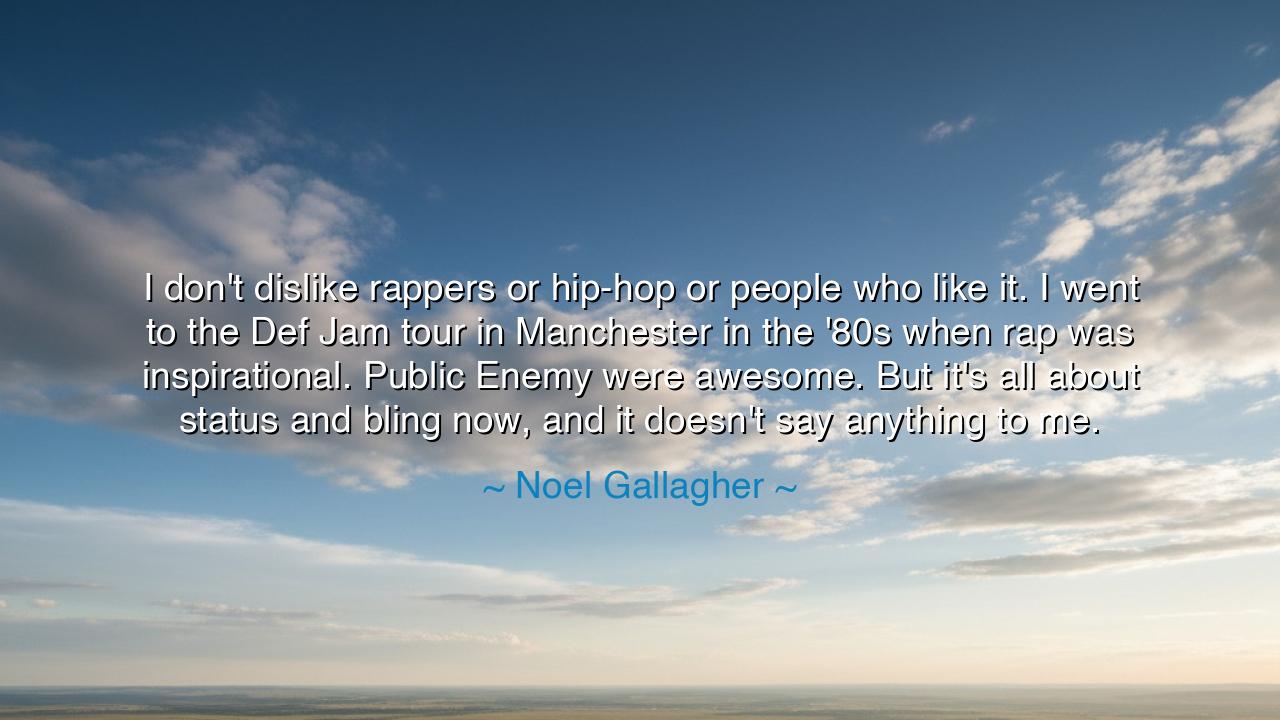
I don't dislike rappers or hip-hop or people who like it. I went
I don't dislike rappers or hip-hop or people who like it. I went to the Def Jam tour in Manchester in the '80s when rap was inspirational. Public Enemy were awesome. But it's all about status and bling now, and it doesn't say anything to me.






In the words of Noel Gallagher, the poet and prophet of a generation that found its voice in the chords of rebellion, there rings a lament both profound and mournful: “I don't dislike rappers or hip-hop or people who like it. I went to the Def Jam tour in Manchester in the '80s when rap was inspirational. Public Enemy were awesome. But it's all about status and bling now, and it doesn't say anything to me.” These words are not a condemnation of a genre, but a cry for authenticity — a plea for the return of spirit, of purpose, of truth in art. Gallagher, who himself rose from the streets of Manchester to become a symbol of honest expression, speaks here as a witness to the transformation of music from a voice of the soul into an echo of vanity.
In the beginning, when the fire of hip-hop first burned, it was not adorned with gold or glitter. It was born in the alleys of struggle, in the hum of rebellion, in the rhythm of survival. The early Def Jam era, which Noel recalls, was a time when words were weapons and beats were banners of resistance. Groups like Public Enemy did not merely perform; they spoke truth to power, igniting minds with thunderous lyrics about justice, race, and identity. They were modern-day bards, guardians of conscience, proclaiming to the world that the voice of the oppressed could no longer be silenced. Gallagher’s admiration for them was not of nostalgia, but of reverence — for in their music, he heard meaning.
But as with all things that touch fame, the golden serpent of status crept in. The sacred flame of art, once meant to illuminate, began to serve as a mirror for self-idolatry. “Bling”, as Noel calls it — the glimmer of wealth, the illusion of power — replaced the humble light of purpose. Where there was once the heartbeat of the people, there came the clamor of possession. It is this shift that disenchanted Gallagher, not because he despised change, but because he mourned the loss of soul. When art ceases to speak truth, it becomes mere ornament — dazzling to the eyes, but hollow to the spirit.
So it has been throughout the ages. In ancient Greece, when the poet Sophocles wrote his tragedies, they were mirrors held up to the conscience of mankind. Yet centuries later, when art became a sport of the wealthy, the stage turned from temple to theater, and the sacred word was drowned by applause. The pattern repeats: when expression becomes display, the divine spark is dimmed. Gallagher’s lament, then, is not only for hip-hop but for all creation that loses its way when it forgets its heart.
Yet let us not despair, for within this critique lies hope — the reminder that art can be reborn as soon as truth returns to its center. Every age has seen its artists reclaim the flame. When Bob Dylan turned folk into protest, when Nina Simone made jazz weep for justice, when Oasis themselves sang of dreams and defiance, they proved that the voice of the real cannot be silenced forever. It waits, like embers beneath ash, for a hand to stir it once more.
And so, dear listener, what Noel Gallagher teaches us is not to reject the new, but to seek the genuine. Whether in music, speech, or life, we must ask: Does this speak truth to me? The worth of art — and of one’s soul — lies not in adornment, but in meaning. To live authentically is to resist the glitter that blinds and instead walk toward the light that warms. The noise of the world will tempt you to measure yourself by status and shine, but the ancients knew — gold cannot buy greatness of spirit.
Let this, then, be the lesson for your own days: Create, speak, and live with purpose. Let your voice, like that of Public Enemy or Noel himself, carry the power to awaken rather than impress. Do not fear simplicity, for truth is often simple. Shun vanity’s trap, for it steals not only art but life itself. Build, instead, something that says something — something that matters.
For when your deeds, your words, and your creations arise not from pride but from the deep well of sincerity, then — and only then — will they endure. The bling will fade, the status will crumble, but the truth will echo forever, carried by those who, like Noel Gallagher, refuse to let silence replace meaning.






AAdministratorAdministrator
Welcome, honored guests. Please leave a comment, we will respond soon